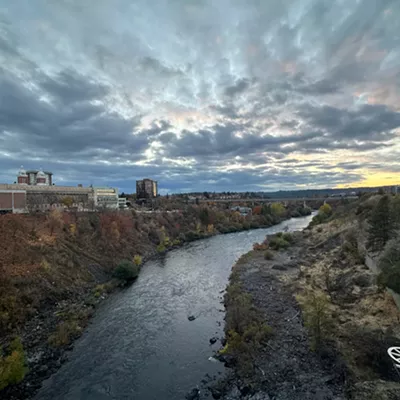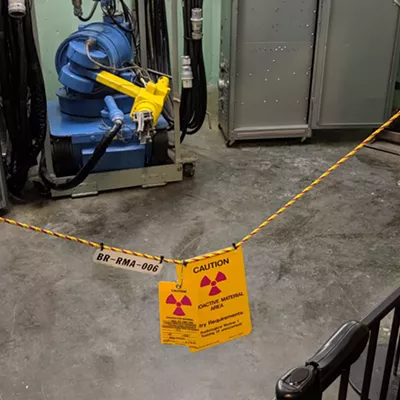After moving around Spokane a dozen times in its 56 years, the American Indian Community Center hopes to stop renting and finally build a permanent home in an underutilized city park.
The center acts as a gathering place and service provider for members of more than 300 Native American tribes from around the country who are residents of Spokane. From providing cultural events and job fairs to helping get rental assistance and food to those who need it, the center's reach has grown significantly, and nearly all their programs are open to anyone in the Spokane community.
After first finding a home at Gonzaga, the community center bounced between buildings in the east end of downtown and spent a few years on North Foothills Drive before moving to its current location on Indiana Avenue near Monroe Street, in a building owned by the Spokane Tribe of Indians.
Since moving into the current spot in early 2020, the center's staff has grown from 13 people to 22, partly due to expanded programs they started offering during the pandemic, explains Linda Lauch, the center's executive director, who's worked there for 38 years.
"It's unfortunate that the building isn't larger, because we've outgrown it," Lauch says.
Those growing pains have been good news for the surrounding community though. One of the programs that expanded the most in recent years was the center's food bank, which operates three to four days a week and serves people regardless of where they live.
"If somebody comes in and says they're hungry and want food, I don't care where they're from, they're getting food," Lauch says.
The center also offers family services, alcohol and drug treatment, clothing, and more, but the current space is not easily accessible for those with disabilities. With limited office and meeting space, the staff started looking to build a bigger home last year, Lauch says.
After working with the city, the center got the go-ahead early this year to start planning for a 25,000-square-foot building in High Bridge Park.
Now, they're moving on to the hard part: raising money.
Lauch says her team worked with Spokane City Council member Karen Stratton — a descendant of the Spokane Tribe — and the city's Parks and Recreation Department to find a location for a more permanent home.
In early January, the city's Park Board unanimously gave them the greenlight to work toward developing two acres at Riverside Avenue and South A Street.
The location is significant because it's near the confluence of Latah Creek and the Spokane River, where area tribes historically gathered for trade and community.
"Being near the river was ideal for us, plus it was a gathering place for Indian people from time immemorial," Lauch says. "I wanted to make sure that wherever we were, the most important thing was it would be accessible."
With a bus stop out front and the potential to build accessible entrances for each level of the building, the hope is to provide amenities for the center's clients as well as enhance the existing park.
The project's estimated cost is about $12 million, and after getting the Park Board's initial approval, the center secured $1 million in state funding for the capital project earlier this year.
Lauch says the center also has a $300,000 commitment from Empire Health Foundation and has received smaller donations from other community partners. The city also allocated about $57,000 in American Rescue Plan Act funding to help the center with its capital campaign.
In addition to asking for about $3 million in federal funding, Lauch plans to seek more state money, secure tax credits, ask for financial help from tribes and gather community donations for the facility.
At a recent kickoff event, the center unveiled renderings for the new space and started spreading the word.
"We set up a special account for the general public to donate to. It can be found at aiccinc.org," Lauch says. "We think it will be a two- or three-year push. It's a marathon, not a sprint, unless anyone knows somebody that can write us a check."
If the campaign is very successful, the goal is to include a gymnasium in the new facility, but in general the plans include a large multipurpose room where the community will be able to host funerals, small powwows and other events, Lauch says.
The center could enhance the use of High Bridge Park and might enable the city to leverage the local funding to secure more state recreation money for improvements at the dog park and to connect Fish Lake Trail with the Centennial Trail, says Garrett Jones, the city's interim administrator who's still overseeing the parks department.
"At the parks department we're always looking for partnerships and win-wins of positive activation, and being able to create a sense of community," Jones says.
The partnership could look similar to how the Liberty Park Library has helped the city improve Liberty Park, Jones says.
Whether the final agreement will include a long-term lease or some type of easement that maintains city ownership remains to be seen, Jones says. There will be more opportunities for public input as the city and the center continue to work together.
"All we want to do is help people the very best way we can. If that means in a leased building, we'll do it there," Lauch says. "But boy, we'd love to have something we could use as a vehicle to share with our community." ♦

























